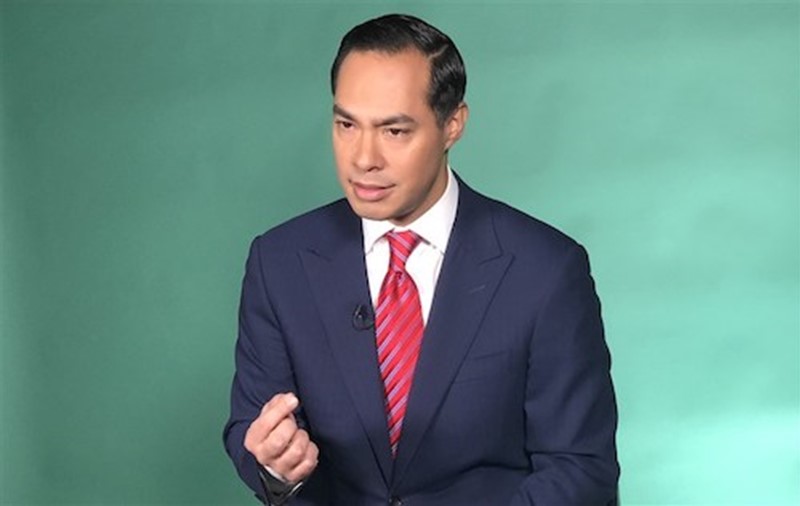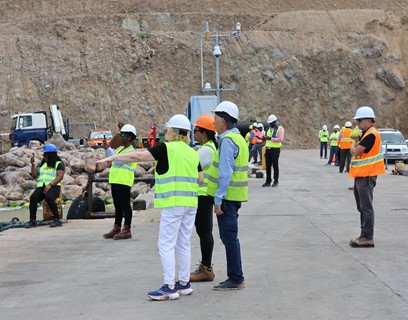
Democratic presidential hopeful Julian Castro sat with Noticias Telemundo’s Anchor Julio Vaqueiro for an exclusive one-on-one interview during LULAC’s Presidential Town Hall in De Moines, Iowa. They talked about the candidate’s campaign, President Trump, immigration and the Democratic primaries, among other issues of interest to the Latino community. Below is a transcript of the conversation.
RULES OF USE: PLEASE CREDIT “NOTICIAS TELEMUNDO” IF YOU QUOTE FROM THIS MATERIAL. TRANSCRIPTS WERE PRODUCED ON A RUSH BASIS AND MAY BE SUBJECT TO CHANGE.
JULIO VAQUEIRO: Okay Secretary, thank you very much for your time. I would like to start talking about the-- the Latino vote. Do you think it's true that Latinos could swing the Democratic primary?
JULIAN CASTRO: Absolutely, Latinos can make a big difference in the primary. Especially because you have states like California and Texas that are voting on Super Tuesday, when this race is still gonna be very wide open. That state. You have Nevada, which is tremendously important, because they vote third. In each of those states, the Latino community is a huge voting bloc, and can make a big difference to determining who the nominee is gonna be.
JULIO VAQUEIRO: Now y-- you're the only Latino in the race. Why do you think so many Latinos are supporting other candidates instead of you?
JULIAN CASTRO: Well, I think a couple reasons. My name ID is not as high as it is for some of the other candidates. Also-- in such a crowded field, it's very f-- the support of every community is very fractured. And I need to go, and I need to earn it. I need to go show it. You know? I'm not taking the Latino community for granted. Just because I'm Latino, I don't think that I'm gonna get, you know, all the-- all of the Latino votes. But I believe that as I get out there to the Latino community, that I'm gonna draw good support in the community.
JULIO VAQUEIRO: No, but this should be your moment, right? I mean, your story with immigration and race in th-- front and center of the debate. Shouldn't your story be more-- it should resonate more-- with-- with the voters, shouldn't it?
JULIAN CASTRO: Well, it's not over yet. We still have over three months until the Iowa caucus. And-- you know, of course, the majority of the voting is gonna happen in the spring of-- of 2020. And so we're working as hard as we can to make sure that I make inroads, not only in places like Iowa, that we're here in now, but-- all over the place. And in the Latino community.
JULIO VAQUEIRO: You've said that you would drop out of the race if you don't raise $800,000 by the end of this month, right? What are you doing differently to get that money?
JULIAN CASTRO: So much of Democratic fundraising these days is done online, in small-dollar contributions. And so we're making a huge push to get online contributions. And I've been very, very happy with all of the outpouring of support that we've gotten. We're more than a third of the way there, and I'm confident that, if we keep working hard, that we'll reach our goal of $800,000 by the end of the month. That'll give me enough to get a-- push to try and get into the next debate. And keep going beyond that.
JULIO VAQUEIRO: If you don't manage to gather those $800,000, have you considered who would you support if you--
JULIAN CASTRO: Not at al.
JULIO VAQUEIRO: --dropped the race?
JULIAN CASTRO: Yeah, no. I'm focused on-- on what I'm gonna do, and-- from the very beginning of this campaign, I've-- I've had a campaign that has been different from all of the other campaigns. We've spoken up for a lot of people who oftentimes are not fought for in politics. I was the first candidate to release an immigration plan, because I'm-- I believe that we need a strong, positive vision of what immigrants can do for our country. I was the first one to release a police reform plan, so that everybody is treated the same by law enforcement.
We've talked about making sure that we address homelessness. About our foster care system. About working families. About a tax code that works for everybody, not just people who are very wealthy. So-- I've been out there, articulating a vision where everybody counts in this country.
JULIO VAQUEIRO: You've said that you wanna break ICE down. You wanna break the a-- agency in-- in two. Right? And you wanna strip some of its powers. How would that help the crisis that undocumented immigrants are going through?
JULIAN CASTRO: Because I believe that the-- the ICE as an organization is run amok. It has an attitude of cruelty. It has an attitude of excess in terms of how it treats many of the people that-- that ICE interacts with. I would like to break up ICE, and to return homeland security investigations to its own division, and then to put most of the enforcement into the Department of Justice. ICE is a relatively new agency. It only came about-- after 9/11. And we can do better. We're always gonna have enforcement. But that enforcement can be reasonable, and can follow common sense instead of cruelty.
JULIO VAQUEIRO: Yeah. I wanna ask you something about Mexico. I don't know if you heard something about what happened last-- last week when the Mexican government tried to get-- the-- "El Chapo" Guzman's son in Culiacan, and that ended up in a crossfire. Very violent situation where the government had to release this drug-- kingpins. Do you think the American government should do something different in the fight against drugs, together with the Mexican government? Or wh-- what should change?
JULIAN CASTRO: We need to work with-- with México to make sure that the United States is doing its part, so that we-- don't have the same kind of demand for illegal drugs in the United States that we have seen, that helps funnel this drug trade that happens out of-- Mexico and Latin America.
I believe that we should look at legalizing things like marijuana here. If we regulate it in a sensible way, I think that's gonna take some of the pressure off of that drug trade. And I believe that we do need to work closely with México so that we can have-- more safety in México. Obviously that's a sovereign nation, and we're gonna respect the-- the wishes of the Mexican government. But, you know, México is also-- you know, the place of my heritage. And in many ways, I'm very proud of that country. But I'm also worried for the country. When I hear things like we heard-- last week about what happened.
Because what you want for the people of a country is you want people to be able to just live their lives. Have a good quality of life, and to be able to have a job, and-- reach their dreams. And it seems like, for so many Mexicans today, they're living in poverty. It's not possible for them to have job opportunities, or even to be safe in a lot of places.
So I-- I hope that-- not only can-- the Mexican government d-- do what it can to make the country safer, but that we can be strong partners in the United States in helping with-- achieving better safety. And also, of course, working together on things like migration.
JULIO VAQUEIRO: Good. Thank you very much, Secretary.
JULIAN CASTRO: Yes.
JULIO VAQUEIRO: Nice talking to you.
JULIAN CASTRO: Good to see you.


